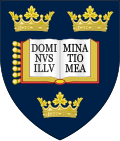
Eric Arthur Barber, [1] FBA [2] (8 October 1888; 24 May 1965) [3] was an Oxford college head.
Barber was educated at Shrewsbury School [4] and New College, Oxford. During World War I he served as an officer with the King's Shropshire Light Infantry. A classicist, he was a Fellow of Merton College, Oxford, from 1910 to 1913. [5] He was Fellow, Tutor and Lecturer in Classics at Exeter College, Oxford, from 1913 to 1943; and Rector of Exeter College, Oxford, from 1943 to 1956. [6]
